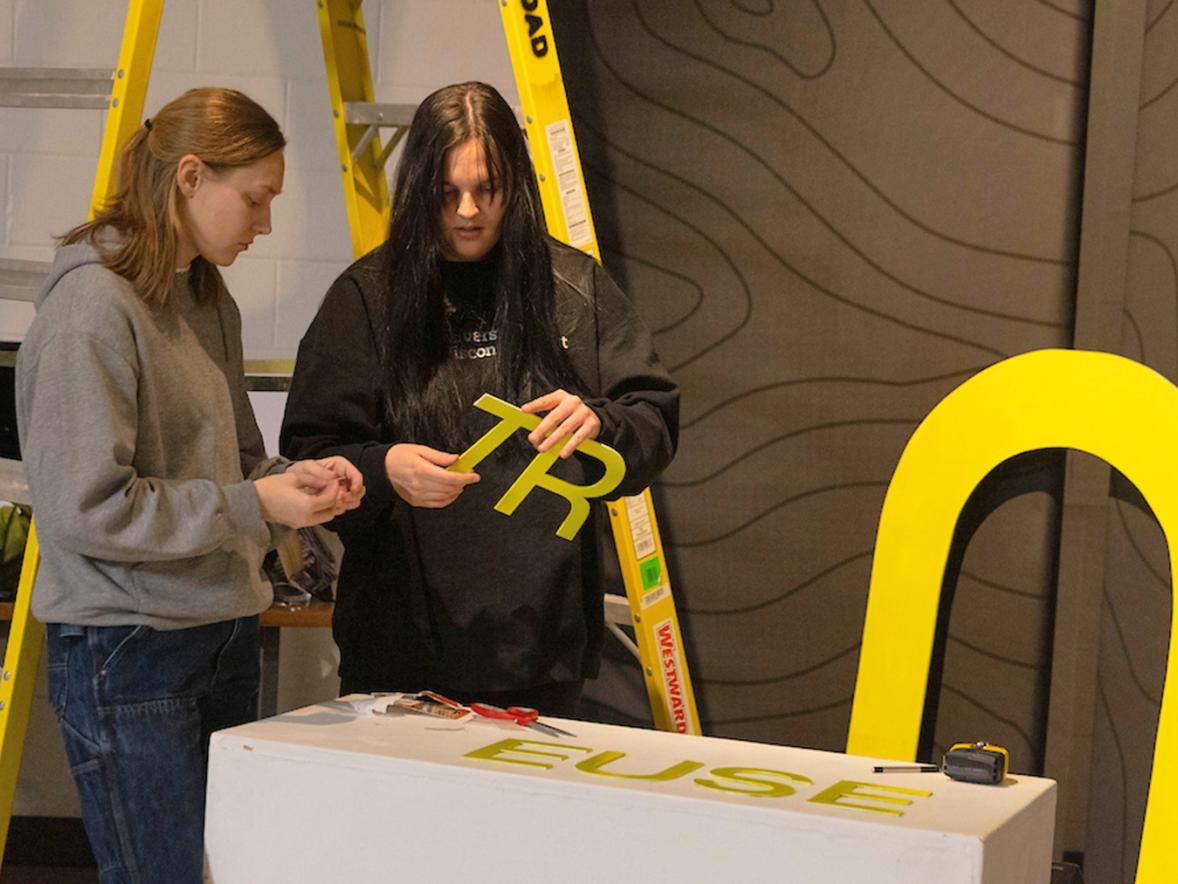Eleven undergraduate students from universities across the nation are participating in an interdisciplinary research experience this summer, led by University of Wisconsin-Stout professors.
LAKES REU students and mentors are working to improve eutrophic lakes in the Red Cedar River watershed. Eutrophic conditions form when too many nutrients, such as phosphorus and nitrogen, enter a body of water. The excess nutrients cause annual blue-green algae blooms in the watershed, and dissolved oxygen levels may cause natural aquatic life to die off.
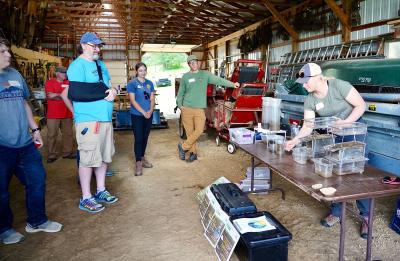
Students are seeking to understand the causes of excess nutrient pollution as they develop sustainable social, economic, and environmental solutions by working with community and government partners, local citizens and policymakers.
Their research is immediately disseminated to the public and available for government agencies, hopefully impacting the community through helping to facilitate positive change in land use and water quality regulations and practices.
A public presentation and forum will be held from 5 to 8 p.m. on Thursday, Aug. 11, at the Raw Deal in Menomonie.
Professor Tina Lee, co-director of LAKES and program director of applied social science, has been involved in the program since its inception in 2014. She loves working with undergraduate students and finds it rewarding to help them grow as researchers.
“I have also chosen to make Menomonie my home, and it was important to me to find some way to contribute to helping the larger community and to working on water quality issues,” Lee said. “My kids will grow up here, and I want this to be a thriving community. I also am lucky enough that colleagues who I really admire, respect and have fun with are involved.”
Mentor and mechanical engineering Associate Professor Devin Berg appreciates participating in LAKES because of the program’s interdisciplinary nature.
“LAKES research provides the opportunity to work on challenging problems in collaboration with researchers from diverse backgrounds,” he said. “You can have anthropologists, biologists, economists and engineers all working together toward a common goal, improving conditions in our watershed.”
LAKES 2022 research
Over the course of nine weeks, LAKES students and mentors are working on four projects, looking at issues around water quality and how to address phosphorous pollution from their unique disciplinary perspectives.
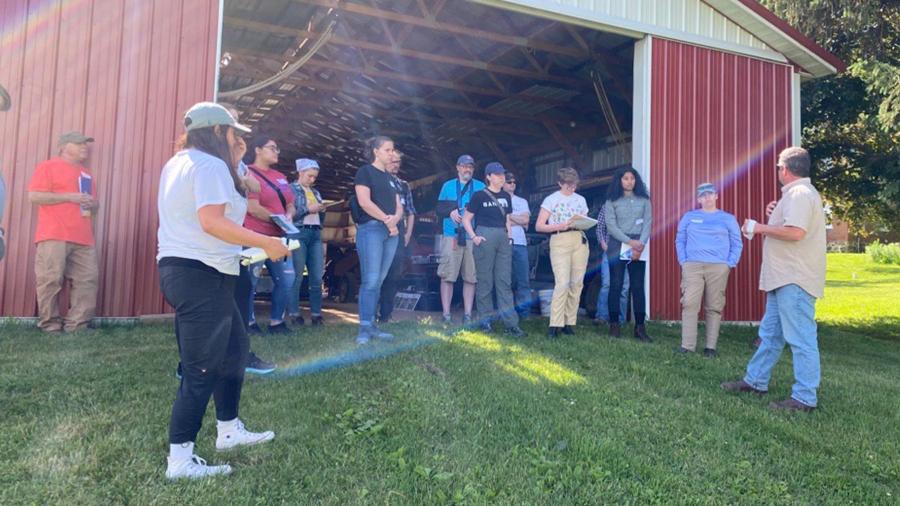
LAKES students also visited a local farm to learn about managed grazing, conservation farming and soil health with Dan Prestebak, retired Dunn County Conservationist; Dunn County Conservationist Chase Cummings; Steve Olson, a conservation planner at Dunn County; and National Resources Conservation Service staff Holly Geurts. They toured Chippewa Valley Bean with Charles Wachsmuth, vice president of the company.
LAKES REU 2022 students are:
- Aiyana Aeikens, Brown University, Providence, R.I.
- Audrey Cho, University of California, Davis
- Sahi Chundu, University of Texas at Dallas
- Abby Cullen, of Menomonie, UW-Stout
- Evelyn Dyer, Lebanon Valley College, Annville, Pa.
- Laura Flucke, UW-Madison
- Phoebe Hemmerling, St. Thomas Aquinas College, Sparkill, N.Y.
- Nidia Lazos, University of Kansas
- Nallely Lepiz-Madrigal, University of Georgia
- Cody Lundquist, UW-River Falls
- Erin McCotter, Northwestern University, Evanston, Ill.
Ethnography of Phosphorus Mitigation Governance and Community Capacity
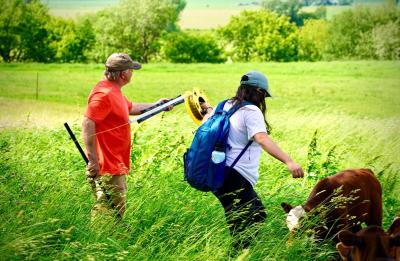
Using ethnographic methods, Lee is mentoring Aeikens, Cho and McCotter as they study how government officials have responded to recent changes in policy, staffing and funding; how organizations shape how farmers manage their land; and how public lands such as the Colfax Red Cedar Preserve and Recreation Area can be used to engage and educate citizens.
Bioremediation of Nutrients
Environmental science Senior Lecturer Arthur Kneeland, co-director of LAKES, is mentoring Cullen, Dyer, Flucke and Lepiz-Madrigal as they analyze methods to reduce aquatic nutrient pollution in the Red Cedar basin by preventing nutrients from entering the water or via plant extraction once in the water.
They are exploring alternative Floating Treatment Wetlands strategies, a traditional tool for phytoremediation of nutrient pollution. They’re seeking FTW strategies that are tolerant of large lakes and in conditions with ice flows, as well as agricultural and economic methods for excluding nutrients from the water.
Engineering of Remediation and Monitoring Strategies
The engineering team is monitoring lake water to collect data that will help other researchers keep a closer eye on conditions in the watershed and monitor them in real time.
Berg, along with Chundu and Lundquist, will design and prototype devices that can provide automated environmental monitoring, data collection and responsive platforms for the growth of more efficient, resilient FTWs.
Environmental Social Influence
Professor Sarah Wood, program director of psychology, is mentoring Hemmerling and Lazos as they explore the use of social influence to promote environmentally sustainable behavior change.
They’re identifying the attitudes and behaviors of community members, farmers and political leaders that may impact water quality in the region. Then they will design and test the efficacy of social influence techniques on changing attitudes and behaviors.
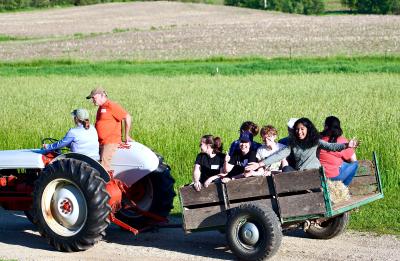
Faculty and students also share their experiences and discoveries in the LAKES REU Blog: The Good, the Bad, and the Algae.
The program took a planned break during the summer of 2020 and then an unplanned hiatus in the summer of 2021. The pandemic made it hard for students to travel to UW-Stout, Lee said.
“We feel strongly that the program continue to have a community and hands-on focus, so a virtual program wouldn’t have worked,” she added.
LAKES REU is funded by the National Science Foundation and by a recent $29,382 grant from the Freshwater Collaborative of Wisconsin, which works to enhance its water-related academic programs.
Students receive a $5,400 research stipend for the summer, as well as housing in UW-Stout’s residence halls, a $450 food allowance and up to $500 in travel reimbursement.





